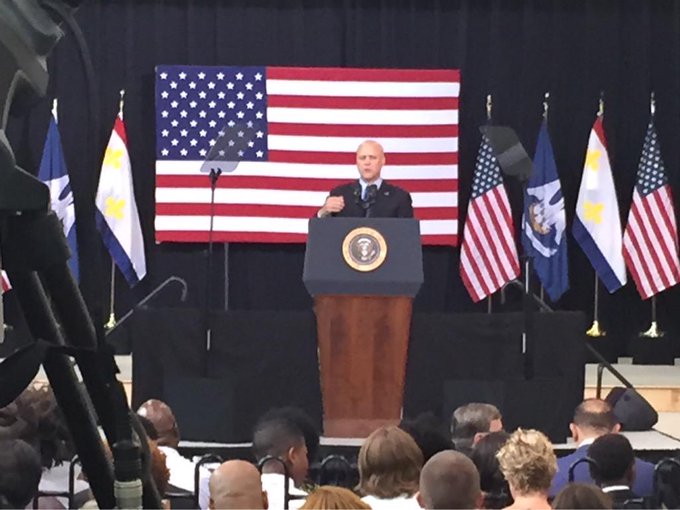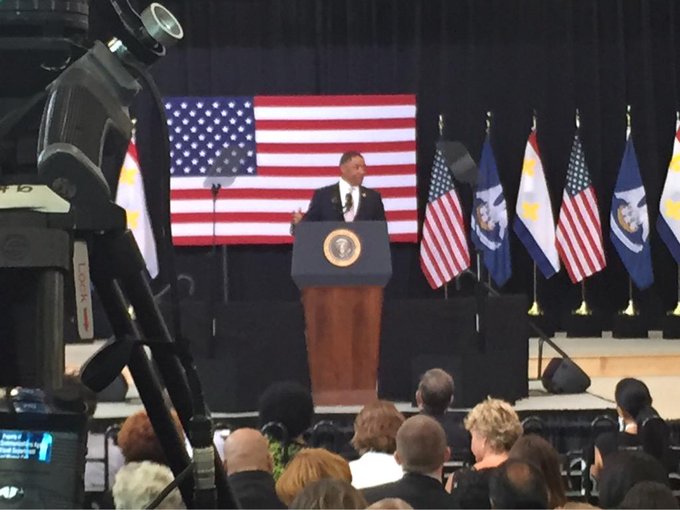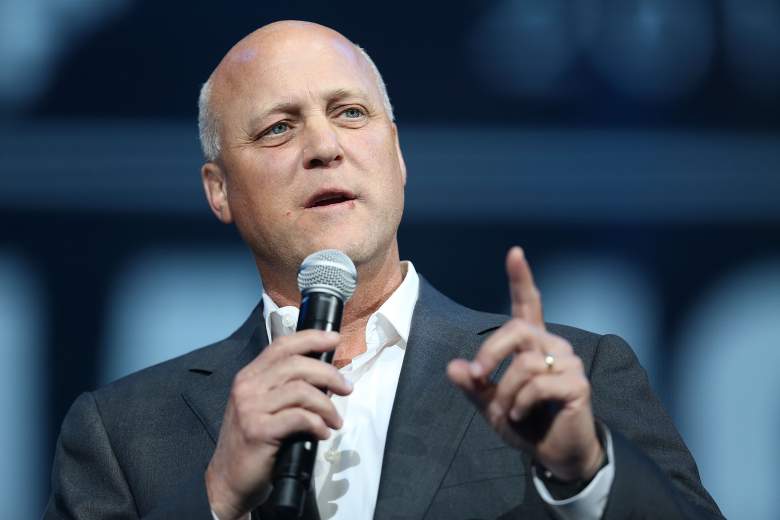
Getty New Orleans Mayor Mitch Landrieu speaks during a Hurricane Katrina 10th anniversary event on August 29, 2015.
New Orleans Mayor Mitch Landrieu (D) has been making national headlines lately after a high-profile controversy over Confederate monuments sparked speculation that he might be headed for a presidential bid in 2020.
A popular mayor, Landrieu has particularly tantalized Democratic strategists with his appeal to minority voters—a constituency that candidates have struggled to mobilize in recent primary elections.
But the mayor, who previously served six years as Louisiana’s lieutenant governor and sixteen in the state legislature, has denied having any current designs on the White House.
However, he has followed up such assertions with statements that he has not considered what he’ll do after he terms out in 2018, leaving the future murky. “I can’t imagine he’d say no if there are people willing to invest in him,” longtime colleague and pollster Bernie Pinsonat told The Hill.
Here’s what you need to know about Mitch Landrieu:
1. Landrieu Rocketed Into the National Spotlight After a Speech He Gave Defending New Orleans’ Decision to Remove Four Confederate Monuments Went Viral
In June 2015, nine people were killed when a 21-year-old white man opened fire with a handgun inside a black church in Charleston, South Carolina. Pictures of the gunman, Dylann Roof, posing with a handgun and a Confederate flag, and spitting on the American flag, quickly surfaced on the internet.
The incident prompted the state legislature to vote to remove the Confederate battle flag that had flown at the State Capitol for more than five decades. The same month, the New Orleans City Council also voted to relocate four historical monuments to the Confederacy that were located in the city, a decision that provoked considerable debate.
In an April 2017 interview, Landrieu told The New Orleans Advocate that “anybody who anybody has known is involved in [the removal project] in any way has received threats.” City officials and contractors working on the project received threats against their lives and families, according to the mayor, and one contractor’s Lamborghini was burned to rubble by arsonists just days after the city announced his involvement in the project.
The monuments were subsequently removed in the early hours before dawn by workers in bulletproof vests.
Upon the removal of the last monument, Landrieu wrote and delivered a heartfelt speech defending the decision. “There is a difference between remembrance of history and reverence of it,” said the mayor, adding:
I want to try to gently peel from your hands the grip on a false narrative of our history that I think weakens us. … To literally put the Confederacy on a pedestal in our most prominent places of honor is an inaccurate recitation of our full past. It is an affront to our present, and it is a bad prescription for our future.
National media pundits widely praised Landrieu for the speech: “Mitch Landrieu reminds us that eloquence still exists,” said New York Times columnist Frank Bruni in a headline. CNN contributor and former advisor to the Clinton White House Paul Begala tweeted a link to the full text of the speech, calling it “moving, powerful, truthful, fearless”; to which a follower replied, “#Landrieu2020?”
2. Some National Democrats Are Speculating That Landrieu’s Popularity, Particularly With Minority Voters, Could Position Him as a Viable Presidential Candidate in 2020
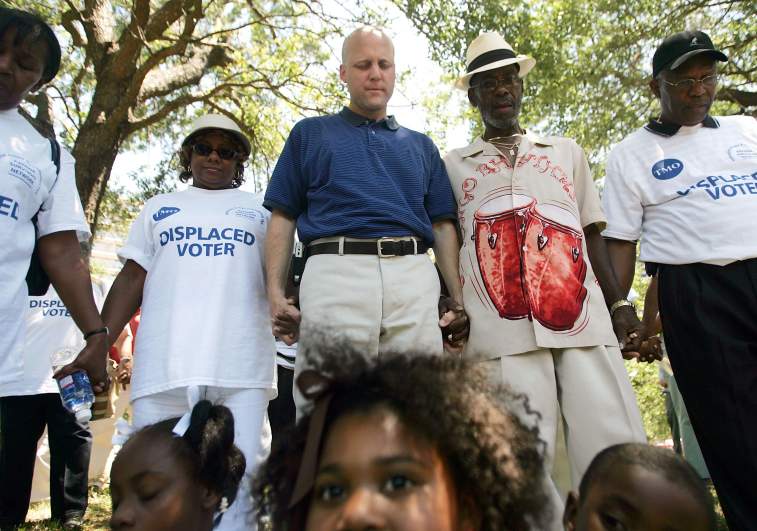
GettyMitch Landrieu prays at a rally with displaced voters during the mayoral run-off election in 2006.
Shortly after the removal of the first monument, a month prior to Landrieu’s now-famous speech, The New York Times had very casually floated his name in an article as a potential contender for the Democratic nomination in 2020’s presidential race. After his speech went viral, #Landrieu2020 gained a small amount of traction on Twitter, and other media outlets joined in the speculation.
Even conservative magazine The American Spectator weighed in, calling Landrieu the embodiment of the “utter lack of substance in today’s Democrat party” and welcoming him as an easy defeat for Trump in the next election.
The Hill ran an article in June 2017 claiming that some Democrats believed Landrieu’s speech had “caught the attention of parts of the liberal political intelligentsia” and “struck a tone that the party craves.”
“Having won statewide in a deep red state and citywide among a predominantly black, Democratic electorate, he has some track record in bridging these divides,” Democratic strategist Adam Sharp told The Hill, adding that recent presidential primaries had “illustrated the expanding economic and racial fault lines in the party.”
The article also intimated that insider sources say Landrieu does have aspirations to higher office, though the mayor himself denied that he was considering a bid for the White House anytime soon, telling BuzzFeed News that he found the Times’ mention “hysterical.”
He did, however, leave himself plenty of room to change his mind about what his future holds when he terms out of office in May 2018: “I’ve got a year left. I’m focused on that work and I haven’t really [thought] about what I’m going to do after that.”
3. Landrieu Comes From a Very Political Family: Father, Moon, Also Served as the Mayor of New Orleans, & His Sister, Mary, Was a Three-Term U.S. Senator
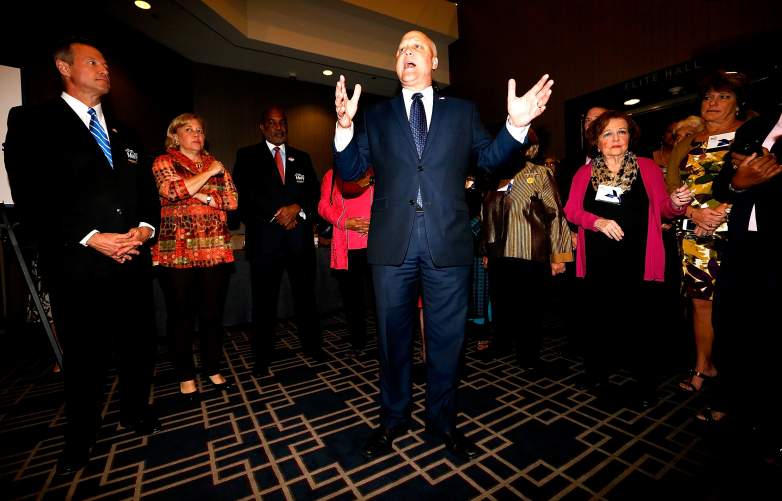
GettyMitch Landrieu speaks at a campaign event for his sister, U.S. Senator Mary Landrieu.
In New Orleans, the Landrieu name is synonymous with public service. Mitch Landrieu’s father, Moon, was elected to the Louisiana House of Representatives as a young lawyer in 1960. After six years in the House, he served four years as a city councilmen in New Orleans before becoming the city’s mayor in 1970.
As mayor, Moon made a name for himself by aggressively working to improve race relations within the city, integrating blacks into the local government, and lobbying for and overseeing the Superdome project. He went on to briefly serve as the U.S. Secretary of Housing and Urban Development under Jimmy Carter and later as a Louisiana Court of Appeals judge.
Three of Moon’s nine children have also worked in the public domain at local, state and federal levels, including Mitch. His sister, Madeleine, also served as a state Court of Appeals judge; his other sister, Mary, served three terms in the U.S. Senate. Prior to her tenure in the Senate, Mary had also served two terms as state treasurer and two terms in the Louisiana House of Representatives.
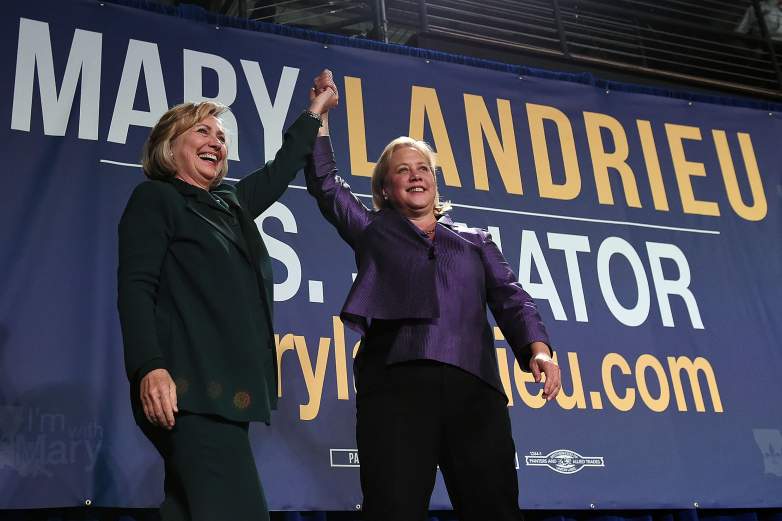
GettyHillary Clinton and U.S. Sen. Mary Landrieu (D-LA) greet supporters during the “Women with Mary Geaux Vote” event at the Sugar Mill on November 1, 2014 in New Orleans, Louisiana.
They are sometimes referred to as “the Cajun Kennedys”, said New Orleans paper The Times-Picayune; and, according to Politico, Mitch is viewed as “the most natural politician in the family.” However, family notoriety can sometimes prove a hindrance.
“Mitch is the best political speaker in the state. The irony is, he might have gone farther if his name had been Mitch Jones. Landrieu fatigue has a tether on him now,” said Louisiana Radio Network host Jim Engster in December 2014. “But there’s nobody in his league here as a stump speaker. He’s got three years to finish out as mayor. And in 2018 the city celebrates its tri-centennial,” he added, hinting that Landrieu may have more opportunities yet to prove his mettle.
4. During Landrieu’s Tenure as Mayor of New Orleans, Murder Rates Dropped & New Businesses Are Thriving
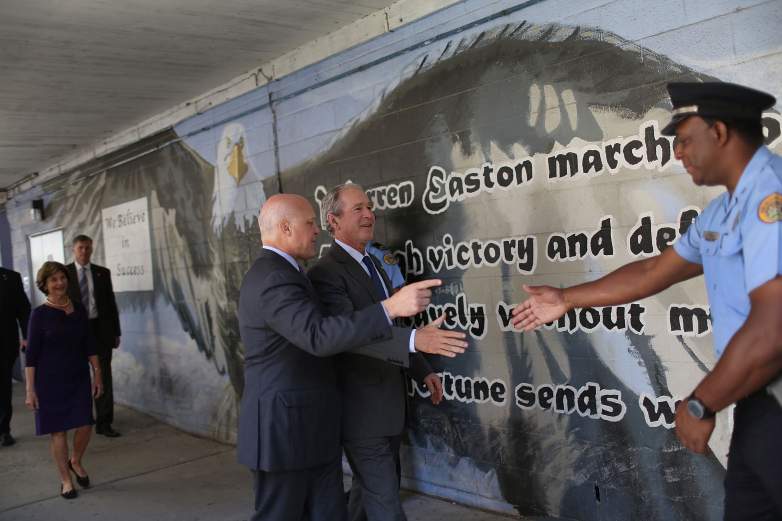
GettyFormer President George W. Bush is introduced to a police officer by Mayor Mitch Landrieu as they attend an event at Warren Easton High School to mark the 10th anniversary of Hurricane Katrina on August 28, 2015.
In 2015, Landrieu was honored in Governing magazine’s annual Public Officials of the Year contest. Governing writer Alan Greenblatt wrote in the commendation:
[New Orleans] has done particularly well on his watch. According to a Brookings study, the number of businesses being started is about two-thirds greater than in most cities as measured on a per capita basis, and well over double the rate in New Orleans prior to Katrina. The city has a thriving tech startup scene and has become a major magnet for young people with college degrees.
Landrieu has also received accolades for record-low rates of murder and gun violence during his time as mayor. New Orleans has consistently ranked in the top tenth percentile for homicides across the U.S. since the 1970s, and in March 2011, the U.S. Department of Justice released the results of an extensive investigation into the New Orleans Police Department:
NOPD officers too frequently use excessive force and conduct illegal stops, searches and arrests with impunity. In addition, the Department’s culture tolerates and encourages under-enforcement and under-investigation of violence against women. The Department has failed to take meaningful steps to counteract and eradicate bias based on race, ethnicity, and LGBT status in its policing practices, and has failed to provide critical policing services to language minority communities.
In response to the investigation, Landrieu and U.S. Attorney Eric Holder submitted a federal consent decree outlining sweeping reforms across the NOPD, including “new policies, training, and practices throughout the Department.”
In 2012, Landrieu also launched NOLA for Life, an anti-violence campaign that began indicting gang members with almost immediate results: August and December 2013 each saw the lowest number of shootings per month since 2010, and in 2014, just 150 people were murdered—the lowest annual murder rate for the city since 1971.
Indeed, “homicides in New Orleans experienced a statistically significant reduction above and beyond changes observed in comparable lethally violent cities,” confirmed a 2015 study from the University of Cincinnati.
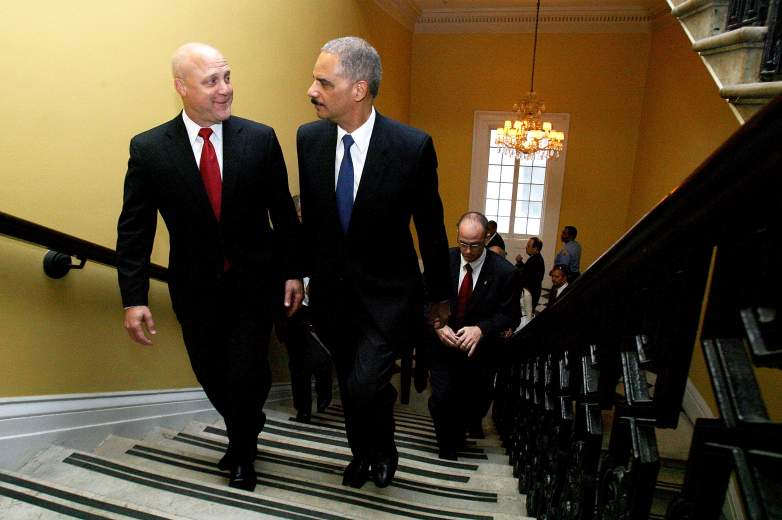
GettyMitch Landrieu and Louisiana Attorney General Eric Holder before announcing sweeping reforms to the New Orleans Police Department.
“My goal has been to get the NOPD fully in compliance with the consent decree before I leave office next May. … I am proud of the work our NOPD leadership has done to transform the department and to remake the police force into a 21st century institution,” said Landrieu upon the August 2017 renewal of the NOPD’s contract with the federal decree monitor.
At the renewal hearing, U.S. District Court Judge Susie Morgan stated that the “Monitoring Team’s reports have highlighted significant improvements in almost every area of the Consent Decree, including policies, training, supervision, custodial interrogations, sexual assault and domestic violence investigations, uses of force, use of force reporting, and use of force investigations.”
5. However, Even Landrieu’s Supporters Point Out That His Successes Have Been Limited in Scope, & Many Major Problems Have Yet to Be Addressed
Despite dips in the murder and shooting rates in 2013 and 2014, New Orleans under Landrieu has, at best, ranked as having no lower than the fourth highest murder rate in the country. The number of annual shootings rebounded in 2015 and 2016, and had already started to skyrocket halfway through 2017.
New Orleans crime analyst Jeff Asher concluded in June 2017 that, as gang member indictments under NOLA for Life slow, gun violence has correspondingly risen: “The initial gains under NOLA for Life were a good step, but Landrieu is leaving office with higher levels of gun violence and murder than when he entered,” said Asher.
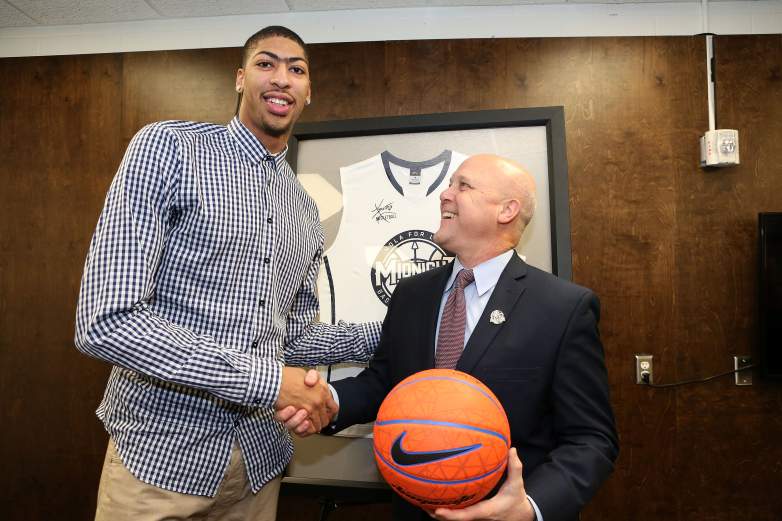
GettyMitch Landrieu and NBA player Anthony Davis attend the NOLA FOR LIFE Midnight Basketball Program at Joe Brown Park.
Some have compared Landrieu’s tenure to that of former Mayor Marc Morial, whose father was also once mayor of New Orleans and to whom Landrieu lost the first of his three bids for mayor in 1994. Morial and then-Police Superintendent Richard Pennington managed to cut the murder rate by more than half, but by 1999, the violence rose to levels even higher than when Morial assumed office.
According to The New Orleans Advocate, Landrieu’s successor, who is yet to be elected, “will inherit a city where violent crime is rising, 911 response times have grown intolerably long, a quarter of the population remains mired in poverty and predominantly African-American neighborhoods continue to lag.”
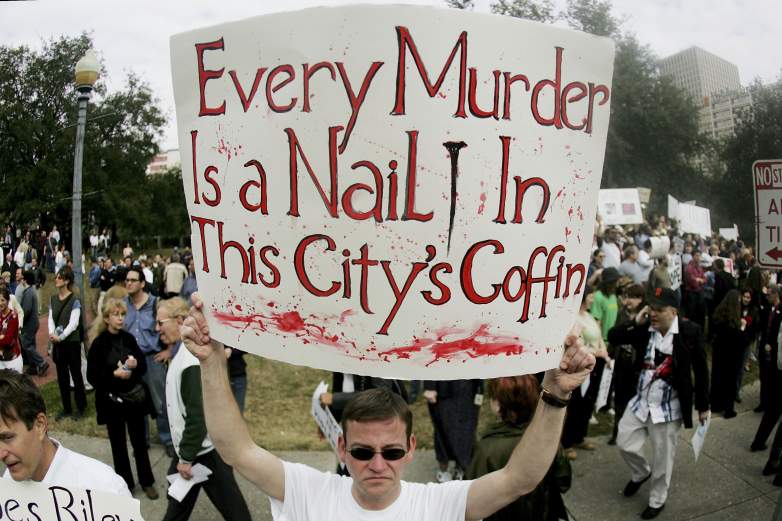
Getty A man displays a sign during a rally against crime in New Orleans, Louisiana.
“While we have made undeniable progress, we have not reached success in terms of sustainable improvement for all New Orleanians,” said president of Great New Orleans Inc. Michael Hecht.
The mayor himself has acknowledged that there is still much to be done. “There is no quick fix; no simple solution that can permanently improve everything. If there were, after over five decades of high crime someone would have already found it and done it by now,” he told his constituents in a June 2017 address.
However, Asher suggested that what Landrieu has failed to do “may be the bleakest aspect of the mayor’s crime-related legacy,” stating that plummeting officer recruitment since 2010 has left the NOPD crippled by insufficient manpower.
“Any effort to paint Landrieu’s legacy on crime as wholly positive or wholly negative … will miss a great deal of underlying complexity,” said Asher. “How we look back at Landrieu’s tenure may be tied to how much his successor learns from his shortcomings and builds on his successes.”
